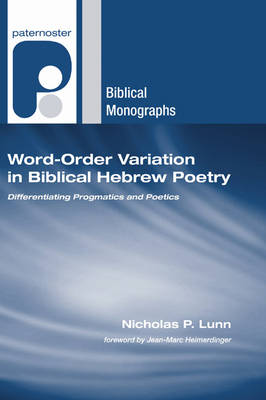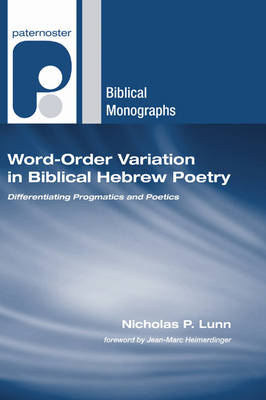
- Afhalen na 1 uur in een winkel met voorraad
- Gratis thuislevering in België vanaf € 30
- Ruim aanbod met 7 miljoen producten
- Afhalen na 1 uur in een winkel met voorraad
- Gratis thuislevering in België vanaf € 30
- Ruim aanbod met 7 miljoen producten
Zoeken
Omschrijving
This study tackles the neglected subject of word order in biblical Hebrew poetry. The fact that the order of clause constituents frequently differs from that found in prose has often been noted, but no systematic attempt has been offered by way of explanation. Here two separate factors are taken into consideration, that of purely poetic variation (defamiliarisation), and that of pragmatic markedness. The former is common to the poetic genre. In the latter case there is a discernible significance in the positioning of the words that has implications with respect to the matters of topic and focus. Using Lambrecht's theory of information structure and building on the insights of previous studies in biblical Hebrew narrative the present volume shows that marked topic and focus structures in Old Testament poetry are identical to those found in prose and are distinguishable from defamiliarised word order by means of the environment in which the latter is found. Here the common phenomenon of parallelism is seen to be an important factor in providing a secondary line in which defamiliarisation may freely occur. This work offers a new approach to the poetry of the Old Testament that will be an aid towards more accurate translation, exegesis, and discourse analysis of poetic texts. ""'Till recently the importance of word order in biblical Hebrew has been largely ignored by grammarians and commentators. This work advances our understanding of Hebrew poetry significantly. It is lucid and thorough. Every interpreter of the Psalms and other poetic sections of the Old Testament will find it an invaluable resource."" --Gordon Wenham, Trinity College, Bristol ""Nick Lunn has given us an entirely new perspective on biblical Hebrew poetry. His book is altogether ground breaking, erudite and thorough; it will become the starting point for future scholarly discussion on the subject."" --Jean-Marc Heimerdinger, London School of Theology ""This work of Nick Lunn makes an important contribution to our understanding of the syntax of biblical Hebrew poetic language. Developing methodologies that have been applied to the syntax of biblical Hebrew prose, he reveals in detail the structural and functional differences in syntax between prose and poetry. He has discovered several syntactic patterns in poetry that have not been recognized by previous researchers in the field and explained why they occur. This volume should be read by all interested in the biblical Hebrew language."" --Geoffrey Khan, Professor of Semitic Philology, University of Cambridge ""Dr. Dunn has tackled a fascinating issue, the significance of non-canonical word order in Hebrew poetry, and he has tackled it with enthusiasm, matched by academic rigour. This is, admittedly, a book for the specialist, but the specialist will revel in its clarity, its caution, its scholarship and its conclusions. Future work on the significance of Hebrew word order, or on such concepts as defamiliarisation, focus and parallelism, will certainly have to take this outstanding work into account."" --Peter Cotterell, Former Principal, London School of Theology Nicholas P. Lunn is a Senior Translation Consultant with Wycliffe Bible Translators. He has worked on Old and New Testament translations in East African languages and is currently assigned to translation projects in Western Asia. He first studied for degrees in Biblical Studies and Semitic Languages at the University of Manchester and was later awarded his PhD in Hebrew at the London School of Theology.
Specificaties
Betrokkenen
- Auteur(s):
- Uitgeverij:
Inhoud
- Aantal bladzijden:
- 414
- Taal:
- Engels
- Reeks:
Eigenschappen
- Productcode (EAN):
- 9781597529594
- Verschijningsdatum:
- 19/10/2006
- Uitvoering:
- Paperback
- Formaat:
- Trade paperback (VS)
- Afmetingen:
- 154 mm x 228 mm
- Gewicht:
- 571 g

Alleen bij Standaard Boekhandel
+ 130 punten op je klantenkaart van Standaard Boekhandel
Beoordelingen
We publiceren alleen reviews die voldoen aan de voorwaarden voor reviews. Bekijk onze voorwaarden voor reviews.











